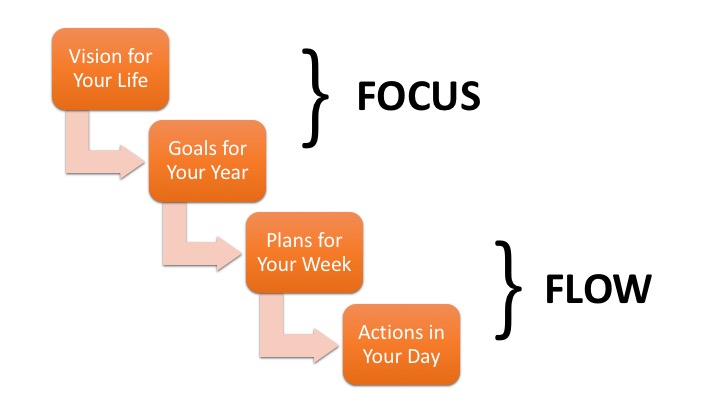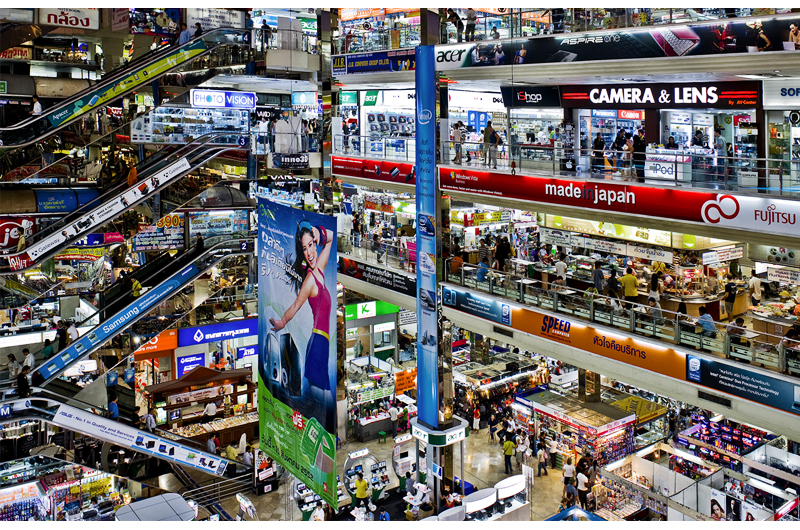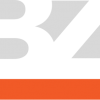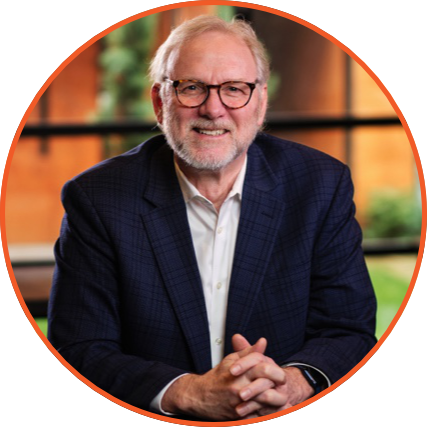Walk into any mall in any city in America and you’ll be confronted with a dizzying array of things to buy. Clothes, shoes, jewelry, furniture, watches, computers, televisions, and enough food to feed an army (or two or three or four).
Try to buy everything that catches your eye, and you’ll soon end up broke and bankrupt.
The current climate in which we live and work has a similar dynamic. A dizzying array of things to do—meetings, tasks, texts, email, dates, and deadlines—confront us every minute of every day. Try to fit them all in, and you’ll end up emotionally broke and physically bankrupt.
There are two secrets to surviving, and even thriving, in this 24/7 tsunami: focus and flow. Here’s how each works:
The First Secret: Focus
This first secret asks a simple question, “What are the most important things of the most important things in your life?” Asking this question in a repeated, rigorous way applies focus to the myriad of options available to you and how you spend your time.
It’s like setting a budget before you go to the mall. A budget, not because you’re cheap (Okay, you may be cheap, but that’s a different story), but because you have important financial priorities you want to be true to no matter what.
This is a question with two parts. The first part asks what the most important things are in your life. But that’s not enough. The second part of the question sharpens your focus even more.
Being in good physical shape may be an important priority to you. But there are dozens of ways in which to do that. Which one will you choose? Likewise, giving back to the community in service to others may be something that rises to the top of your list, but how exactly will you do that?
That’s why this question doubles down on the most important things of the most important things. The point is to uncover the absolute highest priorities of your life and leadership, not just passing interests.
No one can answer this question for you. And don’t let them. That’s where much of our busyness comes from, fulfilling the expectations of others and not following our own voice, blazing our own trail.
Having answered this question, the next question to answer is: What are you going to do about it? That is, if these are your highest priorities, what goals will you set to get them done? It’s one thing to have a dream, quite another to give that dream a deadline.
The first part of the focus question is aspirational, even idealistic. But the second part is real, measurable, and practical. Vision is the ongoing mission for the key areas of your life, goals are the plan that emerges from your mission each and every year.
The Second Secret: Flow
Armed now with your vision and your goals—dreams with deadlines—secret two, flow, now comes to the party.
Flow is very different than focus but just as important to the process. Focus selects from a myriad of options what is to be done, flow now takes those selections and makes them work in real time.

Focus is cool and calculating, almost ruthless in pruning unimportant activities from our life. Flow, however, is emotional, even is artistic, allowing those activities to flourish.
Flow is a term pioneered by the legendary Mihaly Csikszentmihalyi in his groundbreaking book by the same name. It refers to a state of optimal experience where we’re doing something that captures our attention and consumes our imagination, seemingly without exerting any effort whatsoever.
Flow challenges us without breaking us, keeping us from boredom without burning us out. In a state of flow, time stands still and work feels like play.
The great misconception about flow, however, is that it’s a random occurrence, a mystical event that comes and goes like a mirage. This isn’t the case. We create the conditions for flow to exist by spending protected time on the things that give us energy.
Experiencing flow on a consistent basis is the result of wise planning, not dumb luck.
In this way focus leads to flow. In other words, focus culls from all the things we could do, the things we must do because they are our highest priorities: the things we believe in deeply, the things that give us joy. Flow then makes time for these things so we actually do them.
The process looks like this: vision becomes goals, and goals become steps of action we place in our calendar, protected from the demands of others that would derail them. This practice is known by a decidedly un-flowlike term, time blocking, but it’s a central discipline that allows optimal experience to take place.
I time block sales calls and writing sessions, exercise workouts and date nights by scheduling them in my calendar each week as uninterruptable events. I do this because they are the most important things of the most important things in my personal and professional life.
MORE: How to Make the Most of Every Week in 60 Minutes or Less
When a week doesn’t flow, we must discover why and make the necessary corrections. If we don’t, more weeks will be wasted, and along with them, ultimately, our very lives. If the unexamined life is not worth living, neither is the unexamined week.
The Real Power of Productivity
Which brings us to the real power of personal productivity. The real power of personal productivity is not to see how much crap we can cram into a day. In fact, it’s just the opposite. It’s real power is to uncover the things we feel most deeply about, our passions and priorities, and give them the protected time they need to grow and flourish.
This is the secret to surviving, and even thriving, in the crazy-busy world in which we live and how to spend this precious thing called time: find your focus and give it flow, every day of every week.


